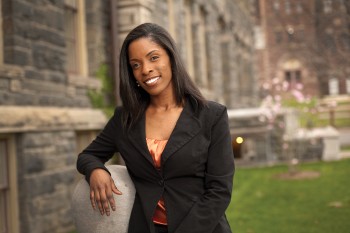COVER STORY SIDEBAR


Graduate student Deondra Rose. See larger image
Graduate student Deondra Rose hasn't been hired yet, but she is likely to be part of the next generation of college professors.
The Ohio native was a prelaw, political science undergraduate at the University of Georgia who had been accepted to law school. But her career plans took a sharp turn when she realized how much she loved working on several scholarly research projects. Various professors said they saw in her the makings of a great academic scholar, and they encouraged her to pursue a Ph.D.
Fast forward to today: Rose is in her fourth year of a Cornell doctoral program in government, studying American politics with a focus on public policy.
Doing research, she says, tapped into the same thrill she got from court cases. "It's what I like most about what I do, being able to craft arguments in a new way," she explains. "I think I find it much more fulfilling than I would have found law, because I have a lot of autonomy over the research I undertake. So it suits me very well.
"It's really sad, actually, how much fun I have on a project," she says. "I can sit on LexisNexis Congressional and just read … I read The Congressional Record, committee hearing [transcripts], I watch a lot of C-SPAN, and it is all just 'must-see TV' for me. This is my 'Lost.'"
Rose has also come to love teaching, having been a TA for five different Cornell classes (she was recently awarded the Dean's Prize for Distinguished Teaching from the College of Arts and Sciences).
"The more I learn, the better I can do as a teacher, the more I can convey, and I can be more creative in how I package material," she says. "Being able to process information and then present it in a way that others can grasp and find useful" has been another welcome challenge.
Rose's dissertation examines the impact of federal higher education policies on gender equality and political participation in the United States, and she plans to continue researching higher education policy and the effects of social policies on mass political participation.
Rose says the government department fosters a collegial environment where academics thrive and the faculty are "brilliant" -- "you can tell they really enjoy what they do," she says. They make a strong effort to work with students and graduate students, she says, and their interactions across their areas of expertise saturate the department in a wide variety of ideas.
"It's thrilling to watch her -- she's a rising star," says Suzanne Mettler, professor of government and Rose's dissertation adviser. "I am unabashedly enthusiastic about this young, up-and-coming scholar. Deondra is very smart, thoughtful and curious; she writes extremely well, and she presents just as lucidly; she possesses a terrific work ethic and is highly disciplined and organized. She is very poised and professional in everything she does.
"She has tremendous potential in all of the different dimensions that we look for in a strong faculty member," Mettler says. "Once she's on the job market herself, she is going to do very well."
Rose knows she wants to work at a research university where "there is this expectation that you're going to be a productive scholar as well as an effective teacher," she says, and research universities offer the support to make sure their faculty can do both well.
"From looking at the scholars in my department, I see examples of how to make that happen, and I'm not scared," Rose says.
![Faculty Recruitment What the Strategic Plan says:
Emphasize a faculty recruitment strategy of building from the bottom [recruiting new Ph.D.s and rising stars] over the next five years](images/CS.Rose.Quote.jpg)